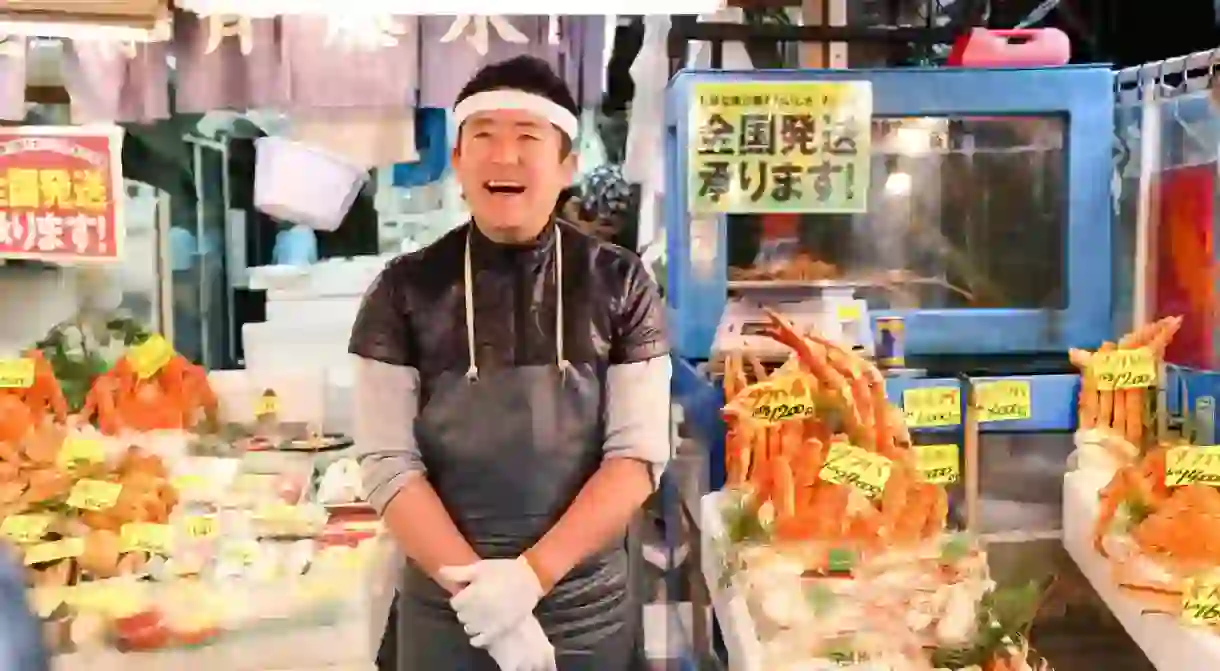The Best Food Markets in Tokyo

In Tokyo, the food market scene is incredibly eclectic and sometimes hard to track down. But if you know where to go (and when), you’re in for a treat.
Tokyo’s best markets can be found tucked deep underneath shopping centres, at monthly pop-up park events and hidden away in traditional neighbourhoods. The range of food markets in Tokyo is as diverse as the city’s contemporary culinary scene, and there are places to cater to all sorts of niche tastes.
Start off with a classic, Tsukiji Fish Market

After years of political controversy, the tail end of 2018 saw the famous Tsukiji Fish Market, also known as Tsukiji’s inner market, relocated to its new home in Toyosu. However, Tsukiji’s outer market is as vibrant as ever. The network of maze-like, narrow alleyways is populated by ramshackle shops and cosy restaurants selling some of the best local snack foods in the city. One of the market highlights is Tsukiji Shouro, a tamagoyaki (fried egg) corner stall whose omelette sandwich is so popular it typically sells out by lunch.
Try Tokyo’s best seafood at Toyosu Fish Market
In late 2018, the previously relatively unknown neighbourhood of Toyosu became the new location for Tokyo’s famous fish market. Although it may not have the historic legacy of Tsukiji, it’s still a one-stop location for all your sushi needs. If you get there at around 5.30am to catch the tuna auction, be sure to head to the market’s Building 6 to watch the sunrise over Tokyo Bay. In this building, you’ll also find most of the market’s restaurants, including the famous Sushi Dai, where people line up way before dawn to grab a table. If you’re not an early riser, don’t worry, as you’ll find a massive selection of other sushi restaurants as well as cafes, curry shops, and ramen restaurants, too.
Can’t wait try some delicious dishes? Book your Toyosu Fish Market tour now!
For the freshest produce, visit Farmers’ Market UNU
Every Saturday and Sunday, Tokyo’s United Nations University holds one of the city’s most popular and longest-running regular markets, the UNU Farmers’ Market. Here you’ll find stalls run by farmers from around the local region. Nestled in the unlikely concrete surrounds of the high-end Omotesando and Aoyama shopping and gallery district, the market is home to organic, locally sourced produce. It’s just a 15-minute walk from the candy-coloured streets of Harajuku’s kawaii epicentre, Takeshita Dori, and provides a laid-back, down-to-earth alternative to its sugar-coated neighbour.
From black market to nightlife hub, check out Ameyoko Market

Just a few steps from the ultra-modern transport hub of Ueno Station sits Ameya Yokocho, or Ameyoko to locals. This busy shopping street has remained practically untouched since its inception as a black market in the years following World War II. Running between Okachimachi and Ueno stations, the eclectic retail and culinary hotspot follows the JR Yamanote line. The layout has stayed the same, but the shops that once traded black-market American goods and sweets now sell Japanese snacks, souvenirs, fresh seafood and everything in between. It’s worth visiting in the day for general grocery shopping, but Ameyoko completely transforms into a vibrant nightlife destination as the sun goes down and the local office workers flood the area for knock-off drinks and yakitori.
Explore the underground world of the depachika at Tokyu Food Show
On the basement floors of department stores across Japan, you’ll find sprawling indoor culinary wonderlands known to the locals as depachika. These indoor food markets offer everything from birthday cakes and boxed lunches to aged sake. Located in Tokyu department store inside Shibuya Station, and running underneath the busy Shibuya Crossing, is the Tokyu Food Show. Arguably the most accessible depachika in the city, Tokyu Food Show is home to around 85 shops that are grouped into Japanese cuisine, international cuisine, and alcohol.
Experience old-world charm at Yanaka Ginza Shotengai

Take the Yamanote city loop line to Nippori Station, and you’ll swear you’ve stepped into a completely different era. A short walk west from Nippori Station sits Yanaka, an old-world neighbourhood home to many cats. Yanaka Ginza is the area’s main shopping strip – ginza in Japanese means high street. It’s along here that you’ll find a community of traditional snack stores, including Niku no Suzuki, a popular croquette store, as well as shops selling classic sweets such as mochi and kakigori (shaved ice) and contemporary hip coffee shops and cafes.
On the way to Senso-ji, take your time exploring Nakamise Dori
One of the most tourist-trodden destinations in the city, the Nakamise shopping avenue is the 250-metre-long path that leads to Tokyo’s oldest and most famous temple, Senso-ji. Lining both sides of the main street are around 90 stores selling a selection of souvenirs, good luck charms, clothing and plenty of tasty Japanese street food. Some culinary highlights along this route include kibi dango, a sweet dumpling made from mochi, savoury rice crackers known as senbei, and chocolate coated bananas, which are also known locally as choco banana.
Go organic at the Earth Day Market
Regularly held across the road from Yoyogi Park, behind Yoyogi National Stadium, the Tokyo Earth Day Market is a celebration of sustainable living and a more eco-conscious lifestyle. Here you’ll find countless stalls selling vegetarian and vegan-friendly cuisine, organic produce and other fair trade, ethical goods. Typically the market runs over one weekend per month. Check out the Earth Day Market website (in Japanese) for information on the next event.













